 |
| Kelly Link |
Q&A: Kelly Link, Holly Black, and Cassandra Clare
by Kelly Link, February 9, 2015 3:16 PM
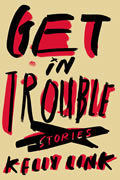
In a joint social media call-out, authors Kelly Link, Holly Black, and Cassandra Clare invited readers to ask them anything they wanted. Below are some of those questions and responses.
Q: Where do you get inspiration for your characters?
Kelly Link: Karen Joy Fowler has said that, ideally, writers should lead boring lives and have interesting friends. I don't necessarily steal directly, but there have been times when someone tells a story about something that happened to them, or to a friend, and it's sparked an idea. For example, my sister told me about a friend who went to a wedding, stayed at a B&B, and had a disconcerting encounter with a piece of taxidermy which was making a lot of noise. I thought about that for years, and it ended up in a story called "The Lesson." Once you have a story idea, you begin to think about the ways that different kinds of people might behave, given a certain set of circumstances. I like to imagine: what a character would like other people to think about her, what kind of thing they might not want anyone to know about themselves, what they want, what most irritates them about their family, etc.
The biggest problem I had, when I was first writing, was how uncomfortable it made me to write characters who wanted something, or who took decisive, plot-shifting action. My trick for getting around that was to have secondary characters who were, more or less, modeled on The Cat in the Hat. The real trick is to like your characters. To make them complicated but always sympathetic.
Holly Black: I've been thinking a lot about this over the last year because creating characters is something I do pretty organically. Unlike plot, which I struggled with extensively, characters are the fun part, the part that just kind of comes to me. But because of that, when I'm struggling with a character, I don't have a lot of tools and tricks to figure things out. But for me, one of the most important things is finding the right name. When I get the name right, a lot of the rest of the character feels right. And then I start digging into that character's secrets...
Q: If you three were in a reality TV show, what would it be about?
Holly: I watch an absolute TON of reality television, so I have a lot of thoughts about this. First of all, we would have make-up people who came and did our full faces and hair before we met up at coffee shops to write, which seems kind of amazing but hard on the skin. Still, glamorous. Then we would fight with our publishers and with other writers and with one another, because that's the primary thing that happens on reality television shows, except the ones where they make a thing that you can see and judge based on its looks — like clothes or food. And we would drink a lot of whiskey and coffee, because that's what writers are supposed to do. But since novels just look like stacks of paper, I think our reality show would be a few scenes of typing interrupted by endless parties and fighting and the occasional book signings that our drunken friends would crash and ruin.
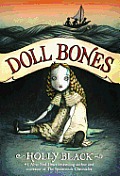 Kelly: I watch very little reality TV but love to hear Holly talk about it. I imagine a show in which we would have to learn a lot of complicated synchronized dance moves, and then prepare meals based around surprise ingredients. Then we would weep in front of a camera or have to plot our way, with a limited budget, from Atlanta, Georgia, to the Maldives. I used to have a fantasy of trying out for The Amazing Race, but during that same period I had an absolute phobia of air travel. Once that phobia went away, mysteriously I no longer had any interest in trying out for The Amazing Race. Anyway: notice that in my reality TV scenario, we get no writing done whatsoever.
Kelly: I watch very little reality TV but love to hear Holly talk about it. I imagine a show in which we would have to learn a lot of complicated synchronized dance moves, and then prepare meals based around surprise ingredients. Then we would weep in front of a camera or have to plot our way, with a limited budget, from Atlanta, Georgia, to the Maldives. I used to have a fantasy of trying out for The Amazing Race, but during that same period I had an absolute phobia of air travel. Once that phobia went away, mysteriously I no longer had any interest in trying out for The Amazing Race. Anyway: notice that in my reality TV scenario, we get no writing done whatsoever.
Cassandra Clare: I also don't watch much reality TV, but my husband likes those shows where cooks face off against one another. What are they called? MasterChef or something? I picture a scenario like that, where each of us is given an ingredient of a story we might write. Like we're given the sentence, "When I saw the cake had been run over, I knew that it was time." Then we would each be forced to write a beautiful piece of flash fiction containing that sentence. At the end of that, we would all take our manuscripts to a bored group of unqualified supermodels and read it out to them. The supermodels would pick the one they liked best and the winner would get to post humiliating messages from the losers' Twitter accounts.
Q: Did any of you ever have an idea for a story or book that you abandoned because it didn't feel like The Sort of Thing You (Are Known for) Do(ing)? Maybe an idea that you contemplated writing under a pseudonym or emailing to a friend?
Holly: Oddly, no. I really love being a weirdo who writes a lot of different things for a lot of different ages. I have been considering doing a guide on my website so that a reader who liked one of my books could find the other books that he or she might like, because I know some of the books are really different from the rest.
Kelly: I've always wanted to write a romance novel. I'd use a pseudonym for that, because Kelly Link is a terrible name for a romance novelist. Many of my favorite writers wrote under a number of different names — Joan Aiken comes to mind. And then, of course, there are writers who have chosen to write under a different name in order to get a chance to start over with a clean slate with regards to sales record or previous career. On the one hand, Megan Lindholm became Robin Hobb — on the other, J. K. Rowling became Robert Galbraith.
Cassandra: Absolutely! For many years before I was a professional writer of fiction, I was an entertainment reporter, first for some very respectable publications and then for some shady and unscrupulous tabloids — not that I ever did anything unscrupulous myself! — but I've always wanted to write a story about what it's like to work for a magazine like that. I still remember the time my boss gave a reporter a one-way ticket to a location where a celebrity was in rehab, saying no return ticket would be purchased until he got the story. But if I did write something like that, I would probably write it under a pseudonym because it's so different than my other work.
Q: Have any of you ever been at a point where no matter how much you wanted to or tried, you just couldn't write? And if so, was it ever for a period longer than a few months or weeks? How much does time and where you are in life (literally and figuratively speaking) have to do with breaking the block?
In my case, I feel like I've always been stuck. I'd often only be able to write a few hundred words of one thing before having an existentialist-verging-on-nihilistic break. "This means nothing! What these characters are doing means nothing! Writing means nothing! I'm just going to rewatch Season 6 of Buffy the Vampire Slayer."
But now I find myself stuck for other reasons. I find myself going through the hardest time in my life as I'm newly 21 and gave up transferring to university to be my mother's primary care giver while she's on hospice, and so now writing and reading things leaves too much open air for me to handle. Writing and reading used to be a way I coped, but now I feel more stuck than ever and I'm nervous about staying that way.
What can I do to be unstuck? Is it possible I just need to wait for the right time?
Kelly: I've absolutely been stuck on stories. I've rewritten the first third of stories over and over again, most recently with "I Can See Right Through You." In general when I'm stuck, I know where I want to get to but I can't seem to get past that initial inertia. There have been other points in my life where I just didn't have enough energy or desire to write. It sounds like you're in a really hard place, with an enormous amount of responsibility on your shoulders. It also sounds as if writing is a source of stress rather than pleasure.
There are two different questions here, though, and I have different answers for both. In the first case, which is how to get past the first hundred words, why not set a limit for yourself of stories at under that length? Try writing very short. And then, gradually, set the word length higher.
But I suspect that you could also try pushing yourself to continue writing, and ignore the voice telling you that your work means nothing. You're writing a first draft. It doesn't have to mean anything. That's for later on, when you get to revision. Kate Wilhelm says that it's much more useful for writers to cultivate the voice that says, "I like that bit! I want to write more of that kind of thing!" Wilhelm says that the more we tell ourselves which of our ideas we like, the more our brains produce those kinds of ideas. Allow yourself to be playful. Play is how you get work done.
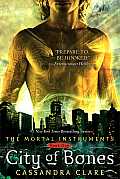 And onto the second issue, which is what to do when life is pressing in on you and you aren't even sure if you want to write. I've gone through periods in which I do very little of my own writing. Instead I type out other writers' stories. It's a slower way of reading, and it's extremely pleasurable. It can also work as a kind of finger exercise. I found it a lot easier, afterwards, to go right into working on my own stories.
And onto the second issue, which is what to do when life is pressing in on you and you aren't even sure if you want to write. I've gone through periods in which I do very little of my own writing. Instead I type out other writers' stories. It's a slower way of reading, and it's extremely pleasurable. It can also work as a kind of finger exercise. I found it a lot easier, afterwards, to go right into working on my own stories.
Holly: I too have been stuck. I am going to talk a little bit about what it was like to be stuck on my first book, Tithe, a book I wrote and rewrote for between five and six years. Many times over that period, I was stuck because I didn't know how to write a book and I got tangled with problems I had not yet learned how to solve (mostly: what happens next; but also occasionally: what are the stakes) and I was also sometimes stuck because of personal stuff that made it hard to concentrate on the book at all (the death of my sister). However, I think the biggest thing that paralyzed me was fear.
I was scared I was doing something wrong, that I was leading the characters down the wrong path. I was scared of making choices. I was scared the book was no good. I was scared that I didn't know how to make it good. And I was super scared that no one would ever want to publish it. I had completely lost touch with the part of myself that thought of writing as play or as something I might actually enjoy sometimes.
One way that I managed to get past it was to focus on finishing. I told myself it would never be published so I didn't need to worry about that. I know it sounds counterintuitive, but it turns out that saying, "Okay, no one will ever see this," and acknowledging that writing it might actually be totally pointless freed me up to write the book.
The other thing that has helped me through periods of stuckness was focusing on small but achievable word count goals. Can you write 200 words a day? 100? 50? In six months, 50 words a day is 9,000 words. That's 2-3 short stories. If you did 200 words every day, in three months that's 36,000 words. That's half a short novel.
Cassandra: I think it helps to think of writers block not as a disease but a symptom of a disease. Try to picture yourself like House on the TV show House. Having a group of attractive doctors assisting you would certainly help. But if you can't manage that, gather instead a group of your scrubby writer friends.
Holly: Hey! I resemble that remark.
Cassandra: Get a white board and write down what you know about your story and where you are stuck. Usually you will realize that you're stuck because you took a wrong turn in the story or you don't know enough about it. You have made a choice that leads to a dead end. Your friends can help diagnose what that choice was or fill in the information you don't know and you can move on. Also, it's never lupus.
Q: I still wonder — don't know — how on God's green earth do you get published? Like you need an agent to get an agent, in this economy. And/or: they don't know talent if it bit them on the whatever. Evidence: Twilight successful, The Cuckoo's Calling not — until we knew who wrote it.
Holly: This is a big, dense question with a lot to unpack. Here's the thing — readers want stuff that makes them feel. Twilight passed like a fever through the sophisticated reader and the unsophisticated reader alike. People devoured those books in single sittings, over weekends, with a kind of raw intensity that is rare. I went to a summer party at a doctor's house around the time that Breaking Dawn came out. Children were playing outside, the barbecue was full of delicious ribs, music was playing, and one of the guests had shut herself in an un-air-conditioned room on the top floor, reading the new book.
When we talk about good books, we often talk about good sentences, but what we rarely talk about is reader pleasure. Yet it is reader pleasure that is going to make a book break out into the kind of success that makes it into a household name. There are very few of those successes and they're a combination of the right book at the right time, put out in the right way.
It's interesting that you see Robert Galbraith, Rowling's pseudonym, as being unsuccessful. Rowling sold the books and got good reviews and a small amount of attention. She was building a series. If all we see as successful are massive behemoth-size bestsellers, then we're all pretty screwed. Well, except for Cassie.
Cassandra: Hey! I worry about this stuff too!
Kelly: This is something that the three of us talk about all the time: readerly pleasure. At this point I'm far less interested in what makes a sentence a good sentence and far more interested in what makes me keep reading a book even when I'm not sure that it's good.
As for the getting-published part, and the agent part, most of the advice that I can give you is going to echo the advice that a lot of other people have previously given. Write the book that you want to write. Think about the kinds of genres that your book fits into. Do some research and discover who has published those books and which agents represent those writers. Look for a writers' group or a workshop, so that you can find out how people are reading your work. It's true that good books aren't necessarily successful. Sometimes they don't find the right agent or the right publisher or any publisher at all. But it's hard to offer more specific advice without knowing more of the particulars.
Holly: Looking at a comment Kelly made above, I see she's with you on the Galbraith-as-unsuccessful train, but I still disagree! In terms of getting an agent and getting published, however, I agree with her completely. Agents are looking for new writers. They're hungry for new writers. Selling a first book is hard, definitely, but agents and publishers really are hunting for the next exciting debut.
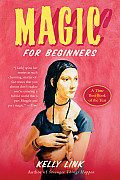 Kelly: Oh! I don't mean that Galbraith was unsuccessful, but rather that Rowling's success was so unprecedented that she chose to submit and publish her next project under a different name. And as Holly and Cassie have pointed out to me in the past, when we've talked about different career trajectories, mystery series are often given more time and space to find their audience. There are any number of bestselling series where the first and second books weren't hits out of the gate. They built an audience by word of mouth. So it seems premature to say that The Cuckoo's Calling was, in any way, a failure when it found a publisher, was well reviewed, and presumably would have found more readers as more books came out.
Kelly: Oh! I don't mean that Galbraith was unsuccessful, but rather that Rowling's success was so unprecedented that she chose to submit and publish her next project under a different name. And as Holly and Cassie have pointed out to me in the past, when we've talked about different career trajectories, mystery series are often given more time and space to find their audience. There are any number of bestselling series where the first and second books weren't hits out of the gate. They built an audience by word of mouth. So it seems premature to say that The Cuckoo's Calling was, in any way, a failure when it found a publisher, was well reviewed, and presumably would have found more readers as more books came out.
Q: Do you have a routine for getting started writing every day?
Kelly: This question is from Sareen! Hi! (Sareen is my fabulous sister-in-law from Aberdeen.) I don't have a routine, and in fact I spend far more time avoiding writing than I spend writing. I can give you my routine for not getting started writing. It involves waking up and checking Twitter or Tumblr. Then I make coffee and do dishes. I brush my daughter's hair. After she's gone to school, I check Twitter again. Maybe I do some laundry. I do a lot of laundry. I make lists of all of the things that I need to do that don't involve writing. I check Twitter again. Often it's time for lunch, or more coffee by the time I've accomplished all of this. At some point I realize that time has passed and I am no longer in any danger of getting any writing done. A strange feeling of relief comes over me. I start to think about dinner.
When I am writing, the routine involves making coffee, drinking coffee, looking at Twitter, and listening to playlists of music. I work better when there's plenty of distraction: if what I'm working on is interesting enough that I can ignore those distractions, then I know it's going well. When things aren't going well, I rely upon Holly Black. She makes me talk about what I'm working on. She asks what I've managed to get done so far. She asks if she can read it. She gives me stern looks.
Holly: Like Kelly, I have lots of techniques for avoiding writing which I could probably claim are "warming up exercises" like, say, finger exercises, although I would be lying. Mostly Twitter, Tumblr, reading blogs, answering email, researching important things, etc. But my routine for actually working involves going to my office or out to a coffee shop, drinking coffee, putting on headphones, and turning off the Internet. Weirdly, then I get a lot done.
Q: Kelly, I cyber-binged on your book recs and playlist! How about visual artists? Thoughts on who would make better company, sorcerers or space witches? Caloric preferences during the writing process? Places you'd only be caught dead? Other than necessities, what three things you, Holly, and Cassie would choose to have if marooned on the moon?
Kelly: Lynda Barry! Andy Goldsworthy! Shaun Tan! Kara Walker! Marcel Dzama! Utagawa Kuniyoshi! Also Kate Beaton, Jeffrey Rowland, Tomi Ungerer, Edward Ardizzone, Quentin Blake, Lisbeth Zwerger, James Turrell, Mark Rothko, Leonora Carrington, Bill Sienkiewicz, Guillermo del Toro. Hayao Miyazaki, Diane Arbus, and Kathleen Jennings. And I'm not sure about the second question — I mean, I'm totally game to hang out with either sorcerers or space witches. Who will make me quality gin and tonics? Which are more likely to be willing to spend a lot of time talking about The Vampire Diaries? Who is least likely to tell me that they have a really good idea for a novel, but what they would like is for me to write it, and then we could split the proceeds?
Food: Ideally while I was writing I would have a machine like the one on Star Trek that would produce whatever food I most wanted: Burmese, sushi, oysters on the half shell, really fancy chocolate. But in real life, I'm fine with coffee, Red Vines, and pho.
As for places and being caught dead, I spent some time in Malaysia and got sicker than I've ever been in my life. I spent a month traveling and throwing up. I threw up so much a piece of vomit got lodged in my sinus and stayed there until weeks later, when I blew my nose hard enough and suddenly the terrible smell went away. So I don't know that I can ever go back to Malaysia. Nasi goreng is delicious, but I can barely even look at the words on a menu.
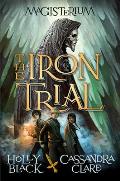 And finally, if I were to be marooned on the moon for an indefinite period of time, I would want all of the seasons of The Vampire Diaries (plus a TV/DVD player), the novelist Sarah Rees Brennan, and a swimming pool. A swimming pool with a floating bar in the middle of it!
And finally, if I were to be marooned on the moon for an indefinite period of time, I would want all of the seasons of The Vampire Diaries (plus a TV/DVD player), the novelist Sarah Rees Brennan, and a swimming pool. A swimming pool with a floating bar in the middle of it!
Holly: Visual artists? I have been hugely inspired by Brian Froud and Alan Lee's illustrated book, Faeries. Also by the artists I've worked with: Tony Diterlizzi, Rebecca Guay, Ted Naifeh, Scott Fischer.
Can we have people with us on the moon? Because I want my family and also Sarah. But if I can't have them, I need a lot of books. And the Internet. And coffee.
It seems like space witches might be the science fictional term for sorcerers. Can't we all hang out together?
Places I would only be caught dead? A zombie apocalypse. Too stressful to be one of the living.
In terms of eating, on deadline everything gets a little weird and I often find myself in a nest of mostly empty cups of coffee, with twists of black licorice, half-eaten sandwiches, etc. It's not pretty.
Q: I've started working seriously on writing speculative fiction while also having a serious full-time career as a scientist. I use some of my professional background in my fiction — speculating about genuine science or coding some mixed media into online short stories that have interactive visuals. When querying an agent, is it appropriate to tell them about my science credentials, even though I'm writing fiction? Or would having a full-time career give agents and publishers a negative impression of my commitment to writing?
Kelly: I am so excited to hear about your background! And that you want to write and use that background. You can mark me down as a future reader. I want, more than I can say, fiction that is informed by the particular experiences and expertise of writers who come to writing from other careers. You should absolutely mention your credentials when you query agents and publishers — they, like me, are always looking for writers with their own unique and particular point of view, which I guarantee that you have. And good luck.
Cassandra: I think that being a full time scientist will not only not hinder you, it will help you in being a professional writer. One of the reasons that we read is to experience other people's specialized knowledge, knowledge that we don't have. People who are experts in all sorts of esoteric fields bring that knowledge to their work and it enriches their stories.
POWELLS

No comments:
Post a Comment